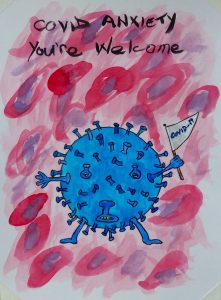We understand that you, our patients, are deeply concerned about how COVID-19 will impact you, especially those of you who may be immunocompromised, such as patients with inflammatory bowel disease, autoimmune disease, or recipients of organ transplants. This is a rapidly evolving situation, with new studies and new information coming out daily. We are watching it closely and will do everything in our power to keep you healthy.
Below, we’ve summarized some key points for staying healthy, especially for those in the most vulnerable groups (such as patients who are older, patients with underlying health conditions, and patients who are immunocompromised). If you have questions about your particular situation, we encourage you to call us so that we can address your concerns. Our telephone number is (919) 870-1311. As you’ve noticed on our website, we’ve closed our office for patient visits and have rescheduled all procedures, but we do have staff taking phone calls.
Tips for Staying Healthy During This Time for Everyone, But Especially Our High-Risk Patients:
-
Avoid non-reputable sources of information.
Incorrect information can spread like wildfire through social media feeds, email, and word of mouth. In this time of uncertainty, we strongly encourage all of our patients to get information from reputable sources only. The CDC has a page dedicated to COVID-19, which can be accessed here: https://www.cdc.gov/coronavirus/2019-ncov/index.html. This page is updated as new information becomes available.
-
If you have been told to quarantine, do so immediately and properly.
In other words, don’t cheat. Follow the exact instructions of the medical professional who has recommended this. Remember, you quarantining yourself while you recover from the illness helps limits its spread to other people, including people who may have underlying health conditions of which you’re unaware.
-
Sleep.
We can’t say it enough. Sleep, sleep, sleep. Americans are often chronically sleep-deprived, which lowers the immune system’s ability to fight off an infection. Current recommendations for adults are 7-9 hours of sleep nightly. Listen to your body about the amount of sleep you need to feel rested, understanding that can vary from person to person.
-
Concentrate on nutrition.
Now is not the time to scrimp on the fruits and vegetables. If anything, it’s the time to really look into what you’re eating and how to eat more healthfully. Remember fruits and vegetables provide essential vitamins and other nutrients that keep your body running at its best.
-
Consider whether a multivitamin should be a part of your daily routine.
A multivitamin doesn’t replace good nutrition. But we know that many of our patients are unable to eat certain foods because of their digestive disorders. A multivitamin can help fill in the gap.
-
Don’t stop taking your medication (especially if you’re taking medicines designed to suppress your immune system) unless instructed to do so by your doctor.
The current recommendation is that you keep taking your medication just as it is prescribed, as the risk of flares of your condition is deemed worse than the potential risk associated with COVID-19. Do get in touch should you start to show signs of infection, such as a high fever, body aches, chills, cough, just like you would do at any other time.
-
Practice social distancing.
The CDC recommends you stay at least six feet away from other people if you have to leave the house for essential reasons (for example, going to the grocery store or to a pharmacy to pick up medications). They also recommend that you not leave the house for non-essential reasons. If you’re considered high-risk, see if neighbors, friends, or family can do your grocery shopping for you and drop it at your front door. Some grocery stores offer a delivery service and some restaurants also deliver.
-
Think mental health.
Feeling stressed or lonely with all of this? There’s a good chance your friends, family, and neighbors are feeling the same. While it’s advised not to visit in person, this is a great time for a phone or Skype chat, a text message, or an email. Now is also a good time to focus on doing self-care things which help you rest and destress. That’s different depending on individuals. Here are a few ideas: take a warm bath with scented bath salts; drink a warm cup of tea on the front porch; start that book you’ve wanted to read for ages; try a new recipe; take an afternoon nap; start a journal of your feelings; build a model airplane; organize the garage; plant an herb garden. Then share what you’re doing on social media. You might just inspire someone else.
-
WASH YOUR HANDS!
If you’re thinking, “Maybe I should wash my hands,” then be like Nike and just do it.
Stay health, stay safe!


Share This